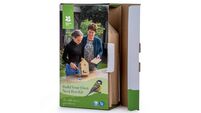ALPACA: A game-changer for dyslexia and reading difficulties in young people

Leitrim parents and children take part in activities in the sensory room at St Patrick's NS in Drumshanbo, County Leitrim — Alan Kelly with his daughter, Sadhbh. Picture: Brian Farrell
The children are excited. A little band of six junior infant pals off with their teacher to find a quiet spot in the school. They’re going to play a game — on an iPad, with headphones, and a QR code that lets the fun begin. Alfie the alpaca will give them instructions.
The four and five-year-olds don’t know that this game is an early literacy screener — a new digital tool that can identify those who may struggle to read, well before they can even read print. Played on an iPad or other tablet device, ALPACA (Assessing Letter knowledge & Phonemic Awareness Class Assistant) is an evidence-based game that slashes testing time and saves on teaching resources while identifying potential future reading difficulties in children earlier — allowing timely interventions to be put in place.








